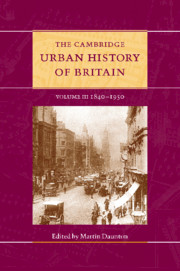Crossref Citations
This Book has been
cited by the following publications. This list is generated based on data provided by Crossref.
Daunton, Martin
2002.
Just Taxes.
McKitterick, David
2009.
The Cambridge History of the Book in Britain.
p.
1.
McKitterick, David
2009.
The Cambridge History of the Book in Britain.
Lenger, Friedrich
2010.
Cities and the Making of Modern Europe.
Journal of Urban History,
Vol. 36,
Issue. 1,
p.
99.
Martí-Henneberg, Jordi
2013.
European integration and national models for railway networks (1840–2010).
Journal of Transport Geography,
Vol. 26,
Issue. ,
p.
126.
Vis, Benjamin N.
2014.
Mapping Spatial Relations, Their Perceptions and Dynamics.
p.
45.
2016.
A History of Modern Britain.
p.
233.
2016.
A History of Modern Britain.
p.
201.
Reick, Philipp
2018.
Gentrification 1.0: Urban transformations in late-19th-century Berlin.
Urban Studies,
Vol. 55,
Issue. 11,
p.
2542.
FAIRE, LUCY
and
MCHUGH, DENISE
2019.
Twelve shades of grey: encountering urban colour in the street in British provincial towns,c. 1945–1970.
Urban History,
Vol. 46,
Issue. 2,
p.
288.
Lan, Tian
and
Longley, Paul A.
2021.
Urban Morphology and Residential Differentiation across Great Britain, 1881–1901.
Annals of the American Association of Geographers,
p.
1.
Delamaire, Marie-Stéphanie
and
Slauter, Will
2021.
Circulation and Control.
Lan, Tian
van Dijk, Justin
and
Longley, Paul
2022.
Family names, city size distributions and residential differentiation in Great Britain, 1881–1901.
Urban Studies,
Vol. 59,
Issue. 10,
p.
2110.



